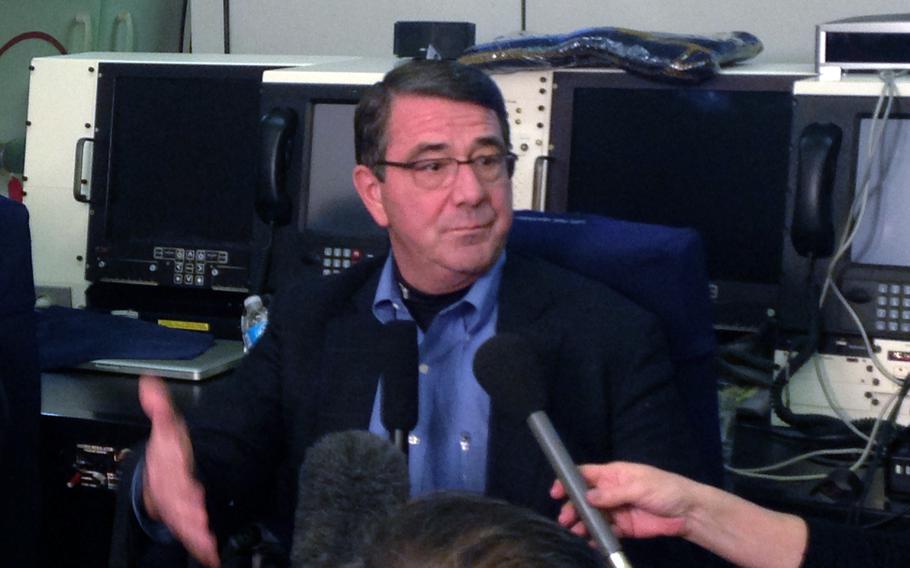
Secretary of Defense Ashton Carter speaks to reporters aboard a U.S. military aircraft en route to Afghanistan. (Jon Harper/Stars and Stripes)
KABUL, Afghanistan — Secretary of Defense Ashton Carter arrived in Afghanistan on Saturday as the Obama administration is weighing whether to slow down the pace of the U.S. troop withdrawal from the country.
The new Pentagon chief, who was sworn in Tuesday, is slated to meet with Afghan political leaders and American military commanders to discuss the way ahead.
There are currently about 10,000 American servicemembers in Afghanistan, down from a peak of 100,000 in 2011. The troops there now are participating in Operation Freedom’s Sentinel, a train, advise and assist mission with a relatively small counterterrorism component.
The current withdrawal plan, laid down by President Barack Obama, calls for U.S. troop levels to be cut roughly in half by the end of this year, with the force shrinking to a small embassy presence by the end of 2016, weeks before the president leaves office.
Army Gen. John Campbell, the commander of U.S. and international forces in Afghanistan, has told lawmakers and Pentagon officials that he wants to take a more conservative approach, retaining more troops at more bases for a longer period of time to support the Afghan National Security Forces in their ongoing fight against the Taliban.
Afghan President Ashraf Ghani has also suggested that he thinks that Obama’s plan should be adjusted.
“Deadlines concentrate the mind. But deadlines should not be dogmas," he said in a CBS ’60 Minutes’ interview last month. "If both parties or, in this case, multiple partners, have done their best to achieve the objectives, and progress is very real, then there should be willingness to re-examine a deadline.”
During his confirmation hearing earlier this month, Carter told members of the Senate Armed Services Committee that he’s open to the idea of changing the pace of the withdrawal and perhaps keeping a significant number of troops in Afghanistan beyond 2016.
“The president has a plan. I support that plan. At the same time, it’s a plan. And if I’m confirmed and I ascertain… that we need to change that plan, I will recommend those changes to the president,” Carter said.
Carter told reporters traveling with him that he’s going to Afghanistan to “make my own assessment of that progress and my own assessment of the way forward.”
While there, he will confer with American military officials, including Campbell and Gen. Lloyd Austin, the head of U.S. Central Command. He will also meet with Ghani and other Afghan political leaders.
He said he plans to ask them for their assessment of:
The performance of the Afghan security forces. American contributions to the fight against the Taliban. The battlefield situation and the prospects going forward. The best way that the U.S. can support the ANSF in the future.Carter will also meet with U.S. troops in the field.
“The reason for (going to) Afghanistan in my very first week in office… is because this is where we still have 10,000 American troops (there), and they come first in my mind always,” Carter said.
Although the U.S. combat mission in Afghanistan officially ended in December, American forces continue to participate directly in the fight.
Earlier this month, a U.S. airstrike in Helmand province killed former Taliban commander Abdul Rauf Khadim and seven other militants.
Khadim had recently declared his allegiance to the Islamic State group.
“He and his associates were targeted because we had information that they were planning operations against U.S. and Afghan personnel there in Afghanistan,” Pentagon spokesman Rear Adm. John Kirby told reporters when the attack was announced. “If (militants are) going to threaten our interest, our allies, our partners in Afghanistan, they're fair game.”
Last month, U.S. and allied aircraft bombed insurgents in Kunar province’s Dangam district to thwart a Taliban offensive. Local leaders said the airstrikes were instrumental in turning back the siege there.
Meanwhile, counterterrorism raids have ramped up in recent months, according to a New York Times report.
In October, U.S. and Afghan special operations forces reportedly carried out a raid against al-Qaida figure Abu Bara al-Kuwaiti, which yielded a massive intelligence haul about the terrorist organization.
The information seized has contributed to a significant increase in joint night raids against Islamic extremists, according to The Times, which cited anonymous American and Afghan officials.
A U.S. military official told The Times that the current tempo of such operations is “unprecedented” for this time of year, which falls outside the main fighting season in Afghanistan.
A former Afghan security official, who informally advises his former colleagues, told The Times that “the secret war” waged by special operators is still “going hard.”
Some U.S. officials fear that a too-fast withdrawal from Afghanistan will lead to a repeat of what happened in Iraq last year, when Islamic extremists routed the U.S.-trained Iraqi army and overran much of the country in the absence of a significant American military presence.
When asked whether he was concerned that the Taliban will undergo a resurgence and make a similar power grab if the U.S. continues to draw down in Afghanistan, Carter said the reason the U.S. is “reassessing what we’re doing is that we want a lasting (military and political) result here… That’s the whole point.”
Gains made in Afghanistan since the 2001 U.S. invasion have come at a high price for American troops: 2,216 servicemembers have died there and another 20,000 have been wounded.
Stars and Stripes reporters Travis J. Tritten and Carlo Muñoz contributed to this report.
harper.jon@stripes.com Twitter: @JHarperStripes